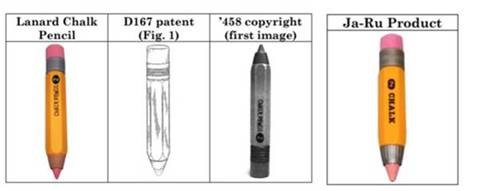Lanard Toys Limited v. Dolgencorp LLC, Ja-Ru, Inc., and Toys “R” US
Before Lourie, Mayer, and Wallach. Appeal from the District Court for the Middle District of Florida.
Summary: A useful article is not copyrightable if the asserted expression is not separable from the utilitarian aspects of the article.
Lanard Toys sued Ja-Ru for design patent infringement, copyright infringement, and trade dress infringement of Lanard’s toy chalk holder designed to look like a pencil with an eraser. Ja-Ru did not dispute using Lanard’s chalk pencil as a reference in designing a similar toy chalk pencil. The district court granted summary judgment to Ja-Ru, holding (i) Ja-Ru’s product did not infringe Lanard’s asserted design patent, (ii) the asserted copyright over the chalk pencil is invalid and not infringed, and (iii) Ja-Ru’s product does not infringe Lanard’s trade dress. The Federal Circuit affirmed.
The district court began its design patent infringement analysis by construing the claim, including identifying the functional and ornamental aspects of the design and considering the prior art. The district court then applied the ordinary observer test, finding that the design similarities stem from either functional aspects or well-established features in the prior art. An ordinary observer would not have believed Ja-Ru’s design to be the same as Lanard’s patented design in view of the prior art. The Federal Circuit affirmed, holding that the district court did not err in its analysis.
With regard to the copyright claim, the district court noted that Lanard’s design was a useful article and therefore would only be entitled to copyright protection if it incorporated artistic features separable from the utilitarian aspects. The district court found that the pencil design did not merely disguise the chalk holder—it was the chalk holder, and therefore was not capable of existing independently as a work of art and was not protectable. The Federal Circuit affirmed, holding that Lanard could not assert protection over the idea of a pencil-shaped chalk holder.
Lastly, the district court found that Lanard also failed to show secondary meaning to support its trade dress claim because it never presented evidence demonstrating its promotional efforts or how customers viewed Lanard’s product. The Federal Circuit again affirmed.

Editor: Paul Stewart
